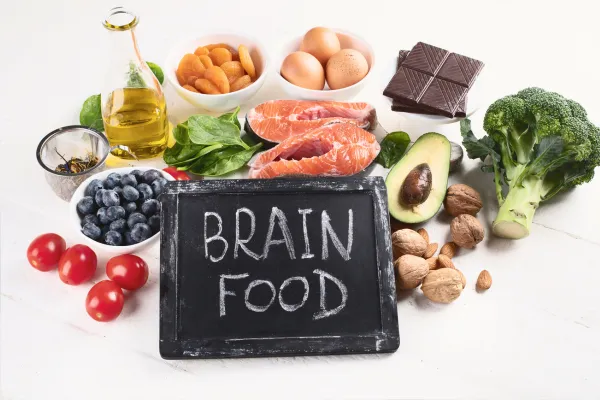
Brain Food: How To Prevent or Slow Down Dementia
“"The quality of your food directly impacts the quality of your thoughts. Diet is a powerful tool that can either boost or diminish your brain's performance"- Dr. Lisa Masconi - neuroscientist and author of The Menopause Brain
The Importance of Nutrition for Brain and Cognitive Health
Our brain, the control center of our body, requires specific nutrients to function optimally. Just as the body needs the right fuel to perform well, so does the brain. Optimal brain health is crucial for maintaining a good mindset, which in turn influences our overall well-being, productivity, and quality of life. Today, we delve into the importance of nutrition for brain health, highlights beneficial foods, explores harmful foods, and examines other healthy lifestyle activities that can enhance cognitive function. My hope is to encourage the reader to take better care of their bodies and brains, honoring the life God has blessed you with and recognizing the generational impact it has on our families.
Nutrition for Brain Health
The foods we consume play a significant role in brain function and cognitive health. Certain nutrients are particularly beneficial for the brain, helping to improve memory, mood, and overall cognitive abilities. Here are some key foods and their positive effects on brain health:
1. Fatty Fish: Rich in omega-3 fatty acids, fatty fish such as salmon, trout, and sardines are essential for brain cell function and structure. Omega-3s support the integrity of brain cell membranes and are vital for cognitive processes.
2. Dark Chocolate: Containing flavonoids, dark chocolate increases blood flow to the brain, which can enhance memory and attention. It also has mood-boosting properties due to its ability to stimulate the release of endorphins.
3. Blueberries: Packed with antioxidants, blueberries help reduce oxidative stress and inflammation in the brain. They have been shown to improve communication between brain cells and delay brain aging.
4. Nuts and Seeds: These are excellent sources of vitamin E and omega-3 fatty acids, which protect the brain against oxidative stress and cognitive decline. Walnuts, in particular, have been linked to improved memory.
5. Leafy Greens: Vegetables like spinach, kale, and broccoli are rich in vitamins and antioxidants that support cognitive function. They contain vitamin K, folate, and beta carotene, which are associated with brain health.
6. Avocado and Healthy Oils: Avocados are a source of healthy monounsaturated fats that promote blood flow, which is crucial for cognitive function. They also contain potassium and vitamin K, which help reduce the risk of stroke. Additionally, avocado oil, olive oil, MCT oil, and coconut oil are beneficial for brain health, providing essential fats that support brain cell structure and function.
7. Turmeric: The active ingredient in turmeric, curcumin, has powerful anti-inflammatory and antioxidant effects. It can cross the blood-brain barrier and has been linked to improved mood and memory.
8. Broccoli: Rich in vitamin K and choline, broccoli supports memory and cognitive function. It also contains antioxidants that protect the brain from damage.
9. Eggs: Eggs are an excellent source of choline, a nutrient that is crucial for the production of acetylcholine, a neurotransmitter involved in memory and mood regulation.
10. Berries: Berries like strawberries and raspberries contain polyphenols, which enhance brain signaling and cognitive function. They help improve memory and reduce the risk of neurodegenerative diseases.
Foods Harmful to Brain Health
Just as certain foods can benefit the brain, others can harm it. Avoiding these foods can help maintain cognitive health and reduce the risk of brain-related issues.
1. Sugary Drinks: Beverages high in sugar, such as soda and energy drinks, can lead to impaired memory and reduced brain volume. Excessive sugar intake is linked to an increased risk of dementia.
2. Refined Carbohydrates: Foods like white bread, pastries, and sugary cereals cause rapid spikes in blood sugar levels, which can impair brain function and increase the risk of cognitive decline.
3. Trans Fats: Found in processed foods, baked goods, and margarine, trans fats can lead to inflammation and oxidative stress in the brain, increasing the risk of Alzheimer's disease.
4. Highly Processed Foods: Chips, instant noodles, and pre-packaged meals often contain high levels of salt, sugar, and unhealthy fats, which can negatively affect brain health and function.
5. Aspartame: This artificial sweetener, commonly found in diet sodas and sugar-free products, has been linked to behavioral and cognitive problems, as well as increased oxidative stress.
6. Alcohol: Excessive alcohol consumption can lead to brain damage and shrinkage, affecting cognitive functions such as memory and coordination. It also increases the risk of mental health disorders.
7. High Sodium Foods: Consuming too much salt can lead to high blood pressure, which reduces blood flow to the brain and increases the risk of cognitive impairment and stroke. Do NOT avoid salt. Salt is a vital mineral that helps regulate water content in the body and is used for the electrical signaling in the nervous system. Try Himalayan Sea Salt.
8. Fried Foods: These foods are often high in trans fats and other unhealthy oils that can cause inflammation and oxidative stress, negatively impacting brain health.
9. Seed Oils: Seed oils such as soybean, corn, and sunflower oil are highly processed, bleached, and prone to rancidity. They contain high levels of omega-6 fatty acids, which can lead to inflammation and negatively affect brain health.
10. Artificial Food Additives: Certain preservatives and additives found in processed foods can have neurotoxic effects, impairing brain function and overall health.
Beyond Nutrition: Other Healthy Lifestyle Activities
While nutrition plays a pivotal role in brain health, incorporating other healthy lifestyle activities can further enhance cognitive function and overall well-being. Here are some modalities to consider:
Regular Exercise
Physical activity increases blood flow to the brain and promotes the growth of new brain cells. Exercise, especially aerobic activities, has been shown to improve memory, learning, and mental agility. It also helps reduce stress and anxiety, contributing to a more positive mindset.
Quality Sleep
Adequate sleep is essential for brain health. During sleep, the brain consolidates memories, clears out toxins, and repairs itself. Poor sleep can impair cognitive function, mood, and overall health. Aim for 7-9 hours of quality sleep each night to support cognitive processes.
Mindfulness and Meditation
Practicing mindfulness and meditation can significantly enhance cognitive function. These practices reduce stress, improve attention and focus, and promote emotional regulation. They also increase gray matter density in areas of the brain associated with learning and memory.
Social Engagement
Maintaining strong social connections is beneficial for brain health. Social interaction stimulates the brain, reduces the risk of depression, and enhances cognitive abilities. Engaging in meaningful conversations and activities with others can keep the brain active and healthy.
Mental Stimulation
Challenging the brain with new activities can help maintain cognitive health. Learning a new skill, playing musical instruments, solving puzzles, or reading are excellent ways to stimulate the brain and keep it sharp.
Conclusion
Optimal brain health is fundamental for maintaining a positive mindset and achieving overall well-being. By incorporating brain-boosting foods into your diet and avoiding harmful ones, you can enhance cognitive function, improve mood, and support long-term brain health. Remember, the journey to a healthier brain starts with the choices you make each day. Prioritize nutrition, engage in regular physical activity, get quality sleep, practice mindfulness, foster social connections, and continually challenge your mind. Your brain will thank you for it and you will honor God by being a good steward of the your mind and body.
References
National Institutes of Health (NIH). Omega-3 Fatty Acids. https://ods.od.nih.gov/factsheets/Omega3FattyAcids-HealthProfessional/
Harvard T.H. Chan School of Public Health. The Nutrition Source: Chocolate. https://www.hsph.harvard.edu/nutritionsource/food-features/chocolate/
Harvard T.H. Chan School of Public Health. The Nutrition Source: Vegetables and Fruits. https://www.hsph.harvard.edu/nutritionsource/what-should-you-eat/vegetables-and-fruits/
Harvard T.H. Chan School of Public Health. The Nutrition Source: Nuts and Legumes. https://www.hsph.harvard.edu/nutritionsource/what-should-you-eat/nuts-and-legumes/
Harvard T.H. Chan School of Public Health. The Nutrition Source: Fats and Cholesterol. https://www.hsph.harvard.edu/nutritionsource/what-should-you-eat/fats-and-cholesterol/
National Center for Complementary and Integrative Health (NCCIH). Turmeric. https://www.nccih.nih.gov/health/turmeric
National Institutes of Health (NIH). Choline. https://ods.od.nih.gov/factsheets/Choline-HealthProfessional/
National Institutes of Health (NIH). Ultra-Processed Foods. https://www.nih.gov/news-events/nih-research-matters/ultra-processed-foods-linked-obesity
Harvard T.H. Chan School of Public Health. The Nutrition Source: Sugary Drinks. https://www.hsph.harvard.edu/nutritionsource/healthy-drinks/sugary-drinks/
National Institute on Alcohol Abuse and Alcoholism (NIAAA). Alcohol and the Brain. https://www.niaaa.nih.gov/publications/brochures-and-fact-sheets/alcohols-effects-body

